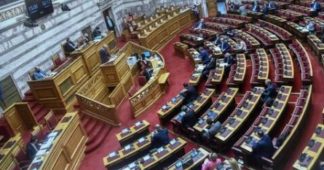Tasos Kokkinidis
SYRIZA, the party that swept to power during the turbulent years of the Greek debt crisis, is in disarray after the election results on Sunday.
The party led by former PM Alexis Tsipras has seen its share of the vote shrink to just above 20%, more than 20% below the governing conservatives of Kyriakos Mitsotakis.
Tsipras, during the election campaign, called for a “progressive government” that could have included Center-left PASOK, which finished third on Sunday, Yanis Varoufakis’ MERA 25 and the Communist KKE. He was turned down by all.
After its defeat, SYRIZA accused them of turning their back on efforts to form an alliance against the conservatives.
Syriza’s Tsipras turns down a mandate to form coalition government
On Tuesday Tsipras turned down a mandate to form a coalition government, saying he was preparing for a second election in June after what he called a “painful” electoral defeat for his SYRIZA party.
The SYRIZA leader personally accepted responsibility for the party’s poor showing in the elections on Sunday. However, he dismissed calls from some quarters to resign.
“I am morally bound to stand and fight,” he said while he apologized “to those he had let down.”
He appealed to his supporters to prevent New Democracy’s dominance in the next election which would probably take place in late June.
A repetition of Sunday’s result would deliver an “all-powerful and uncontrollable, hegemonic and arrogant government,” he noted.
Mitsotakis, whose New Democracy party won 40.8% of the vote on Sunday compared with SYRIZA’s 20.1%, had earlier opted against forming a coalition and has pushed for a second vote in a bid for an outright majority.
“I consider it is my duty to get past the hurdle of simple proportional representation as quickly as possible, and I am willing to return the exploratory mandate to you this afternoon so that we can hold elections, possibly on June 25th,” Mitsotakis said during his meeting on Monday with the President of the Hellenic Republic Katerina Sakellaropoulou, after receiving the first exploratory mandate for the formation of a new government following the elections.
Mitsotakis stressed that the country needs a strong government as soon as possible, with a four-year horizon, and insisted that “the best thing for the country is to discuss the real problems, how we will increase wages and how we will support the social state and to talk about the challenges and the issues that concern the younger generation”.
Under electoral rules, the winner of a second vote following an inconclusive first election receives 20 bonus seats in parliament if they get 25% of the vote, and up to 50 bonus seats if they get about 40%.
If Mitsotakis secured 40% of the vote again or even a little less, he would still have a majority.
We remind our readers that publication of articles on our site does not mean that we agree with what is written. Our policy is to publish anything which we consider of interest, so as to assist our readers in forming their opinions. Sometimes we even publish articles with which we totally disagree, since we believe it is important for our readers to be informed on as wide a spectrum of views as possible.











